See the interactive map here.
For many college students who are part of groups underrepresented in the sciences, an opportunity to go away for the summer to do research at a top university might not feel like it’s in the cards. First generation undergraduates may not know about summer research programs and how to apply, and for many of their families, the costs of travel, housing and meals across eight to ten weeks is an impossible one to sponsor.
In defiance of these financial and institutional barriers, California State University, Northridge’s BUILD PODER program provides avenues for its students to expand their horizons, however many thousands of miles away their academic goal posts stand. Read about BUILD PODER scholars’ exciting summer research adventures in the Q&A’s below.
Sara Shatella
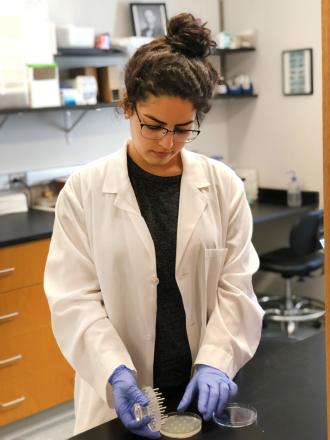
Summer Research Site: Princeton University, Molecular Biology Summer Undergraduate Research Program (SURP).
Research Topic: During the nine weeks I spent at Princeton, I worked in the the lab of Elizabeth Gavis, M.D-Ph.D., and worked closely with a post-doctoral researcher, Matt Niepielko, Ph.D. Our project focused on investigating the relationship between mRNA localization and fertility in drosophila, a type of small fly. We looked at nanos and pgc mRNAs in the female embryo and how their mutations influenced egg-laying and viability.
What was your favorite part about your summer experience?
My favorite part about my experience was getting to network with people from around the nation, including Puerto Rico, New York, Arkansas, Georgia, Pennsylvania, and more. I have lived in Los Angeles my entire life, so getting to experience different cultures and traditions through these interactions was a new adventure. I definitely feel like I grew as a person since I was able to broaden my understanding of these diverse cultures over the nine weeks.
What was the most difficult part about your summer experience?
The most difficult part about my summer experience was probably getting situated and adapting to the new lifestyle. Living in California my entire life has made me comfortable with how things are here, and I forget how different the rest of the nation can be. One challenge for me was overcoming the weather change. I am easily affected by the climate; for example, on a gloomy, rainy day, I feel that my mood is down. Summers in New Jersey are extremely humid and hot—almost every day the humidity is 100 percent—and that really impacted my mood and threw me off most of the time. However, it wasn't too bad since I spent most of my time in the lab. I'm grateful for that experience because I learned a lot about myself that I didn't know before, and now I appreciate the dry heat more than ever.
Did you learn anything new about yourself, your research, the graduate school experience, mentorship, etc?
I learned that when you are looking for a new lab to join, there are several critical factors to consider. Before my summer experience, I thought that the only thing you should care about is the actual research that the lab is conducting--What is the main focus/question? What types of experiments/tools do they use? However, I soon learned that the principal investigator (PI), the lab environment, and the physical geography of the lab are just as important. Ask yourself questions like, “Can you get along with the PI and with your labmates? What does the PI expect of you? Is he/she more independent or do they want you to do things on their terms? To what extent does the weather have an effect on your well-being?” Take all these questions into account because no matter how great the research is, if your other needs are not being met, then you will be miserable. Working in the lab becomes your full-time job and you want to make sure that you are comfortable with every aspect of it. It's crucial to figure out how you like to work, what you like and dislike, etc. to find a lab that best suits you.
Yvette Lugo
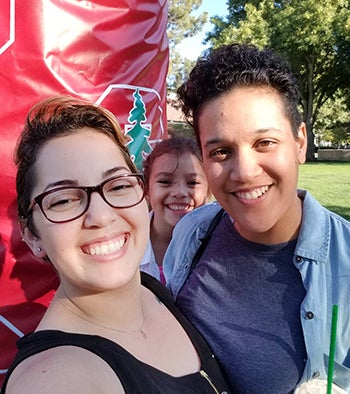
Summer Research Site: Stanford University, Department of Psychology, Stanford Social Neuroscience Lab
Research Topic: During my eight weeks at Stanford University, I worked in the lab of Stanford professor Jamil Zaki, Ph.D., studying the relation between empathy and generosity. Mostly, I worked with postdoctoral researcher Leor Hackel, Ph.D., and doctoral student Yuan Chang Leong. Through administering online studies, we found that empathy inspires generosity, meaning that people overall are more generous to those who empathized with them. We used computer programs like R and MatLab to analyze data. This study was really long and had to be done in four different waves or phases.
In Phase 1, participants wrote about a recent emotionally negative experience. In Phase 2, a second set of participants wrote notes in response. In Phase 3, these notes were rated for empathy by independent judges. In Phase 4, the original participants (those who wrote in Phase 1) were re-contacted. They received notes written for them and allocated rewards in a Dictator Game to the authors. Participants allocated more money to respondents whose notes displayed greater empathy. These results demonstrate that empathy can inspire material generosity, suggesting a role for empathy in reciprocity.
What was your favorite part about your summer experience?
The people in the lab were really kind and very giving. They were all good mentors to me, willing to give advice, share their own experiences and help me with anything. I was very nervous at the beginning of the program and had knots in my stomach the first day heading to the lab. But my mentor took me to coffee my first day and asked me about how I got there and what my interests were, which made me feel more at ease. I also liked the family housing because I got to bring my daughter and partner with me. Each family housing unit was connected around a single park so that everyone had a park in their backyard. My daughter went to a local science camp while I was in the program. Overall, it was a great summer.
What was the most difficult part about your summer experience?
The learning curve on the topic was difficult. We did a lot of literature reviews to understand the topic. My mentor wrote a paper on the topic, so I worked hard to try to understand the topic as well as I could in his lab. Learning the programming also took a while, but it was also really fun because it’s like learning a whole other language. The experience also challenged my confidence in many ways. As an older student, it was intimidating to be around researchers who were much younger than me. I felt behind which was discouraging at first, but I overcame that insecurity because I caught on very quickly. After leaving, my mentors encouraged me by saying I did an amazing job and learned quickly. They also want to keep in touch and see me succeed. Because these mentors all graduated from amazing universities, it was affirming that they spoke so highly of me.
Did you learn anything new about yourself, your research, the graduate school experience, mentorship, etc?
It was really nice to focus on just one thing. At home, I work, take classes and do research, but for the summer I was able to take a leave from work to do my research. I also got more time to be with my family. The experience has inspired me to try my hardest to get accepted into a fully-funded Ph.D. program so that I can earn a living while focusing on school. I also learned that if I do not get accepted to a Ph.D. program right away, I can continue my research as a research assistant so I do not have gaps in my research experience. I learned that I want to move to a more slow-paced environment, very different from the Los Angeles I grew up in.
I also feel like I belong in the professional academic field. I was the only student from a Cal State University, but I never thought about it. I was one of ten students who received a research opportunity through the Society for Personality and Social Psychology’s Summer Program for Undergraduate Researchers (SPUR) program, and I felt like I deserved to be there as much as everyone else.
BUILD has opened a lot of doors. If it weren’t for the program connecting me to my current mentor at CSUN, psychology professor Abraham Rutchick, Ph.D., I would have never learned about summer research and I wouldn’t have this experience.
Bordin Endinjok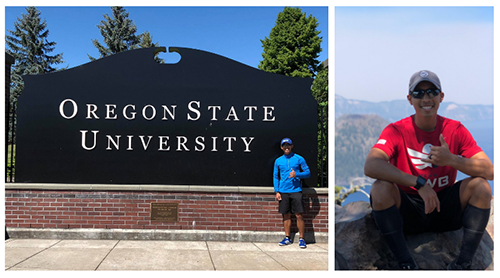
Summer research site: Oregon State University, College of Health and Human Sciences. Individualized Summer Program.
Research Topic: Under the mentorship of Katherine Gunter, Ph.D., at Oregon State University, I spent my summer evaluating and refining the effectiveness of a train-the-trainer model for a physical activity toolkit called “Be Physically Active 2day Toolkit (BEPA 2.0-Toolkit)” as part of community-based participatory research. The BEPA 2.0-Toolkit contains materials and activities aligned with physical education (PE) and health education standards. The Oregon Department of Education (ODE), stakeholders, PE pedagogy experts, and specialists in physical activity promotion and assessment provided input, which allowed the toolkit to be refined. It was tailored to meet the Senate Bill 4 addendum referred to as “FLEX 45”, passed in July 2017, allowing licensed teachers to provide up to 45 minutes of the required 150 minutes per week of curriculum aligned to state PE standards.
Using the toolkit, Oregon’s elementary teachers will be able to provide 45 min/week of PE and health education standard-aligned physical activity breaks. The toolkit includes resources such as training documents, policy and reporting templates, and an implementation manual. All educators will be able to provide classroom-based physical activity breaks with BEPA 2.0 and enhance learning and physical activity opportunities for students through Oregon’s elementary schools.
What was your favorite part about your summer experience?
I worked with students from different majors within the same department to help push this research forward. I learned a lot from my research team and mentor. I enjoyed the responsibilities that were assigned to me such as working with pedometers, writing protocol procedures, and assisting with a manuscript write up. Last but not least, I had the privilege to explore Oregon on many hiking trails.
What was the most difficult part about your summer experience?
The most difficult part was being away from my wife and son. I did not get to spend much time with them this summer as a result of beinghundreds of miles apart. I also had to adjust to a new learning environment with a research team of undergraduate, graduate and doctoral students from many different backgrounds.
Did you learn anything new about yourself, your research, the graduate school experience, mentorship, etc?
I learned that I am capable of completing multiple tasks assigned to me. I also learned about the importance of community-based participatory research and how effective it can be when it is established. When it comes to graduate school experience, I found out that expectations are much greater, and a greater attention to detail is required to complete each assigned task. In terms of mentorship, I was received guidance and advice from my mentor and those around me. Overall, this experience helped me see my capabilities as a researcher. It has also helped me to adapt and overcome the learning curve in new environments.
Federico Prokopczuk
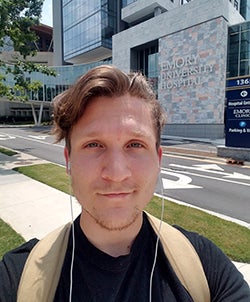
Summer Research Site: Emory University in Atlanta, Georgia. Summer Undergraduate Research Experience (SURE) and Pediatric Engineering Research Summer Experience (PERSE) programs.
Research Topic: Under the mentorship of Vahid Serpooshan, Ph.D., my research was on investigating the properties of nanoparticles in 3D-printed cardiac patches. These are small patches that may be a way to recover some functionality to cardiac tissue that was damaged after a heart attack. My project was investigating whether or not adding small heavy metal particles could help alleviate some of the shortcomings that would arise if they were used in the clinic.
What was your favorite part about your summer experience?
My favorite parts of the program were learning new techniques and being able to do research at my dream school.
What was the most difficult part about your summer experience?
The most difficult part of the experience was also learning the new techniques. This was a biomedical engineering lab, and is run very differently than what I am used to,meaning I had to use software and techniques I had never seen before. While it was a fun challenge, it was also very difficult.
Did you learn anything new about yourself, your research, the graduate school experience, mentorship, etc?
Overall I learned more about what I want and what I don't from my graduate school experience, and that people in the lab can make or break an enjoyable lab environment. I also reaffirmed to myself that I want to go to Emory University for graduate school.
Jessica Yamauchi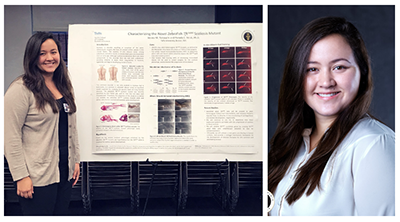 Summer Research Site: Tufts University Sackler School of Graduate Biomedical Sciences, The Leadership Alliance, Building Diversity in Biomedical Sciences (BDBS). Boston, Massachusetts.
Summer Research Site: Tufts University Sackler School of Graduate Biomedical Sciences, The Leadership Alliance, Building Diversity in Biomedical Sciences (BDBS). Boston, Massachusetts.
Research Topic: I worked in the lab of Pamela C. Yelick, Ph.D. The Yelick Lab focuses on a forward genetic chemical mutagenesis approach to identify genes regulating mineralized craniofacial/skeletal/tooth development and regeneration. My specific project focuses on the Tft168N scoliosis mutant in zebrafish that was identified by the Yelick Lab and has not yet been well characterized. This project requires the identification of heterozygous mutant adults, in vivo alizarin red staining, crosses with in vivo reporter lines, and immunohistochemistry (IHC), which is used to better understand the progression of scoliosis in zebrafish.
What was your favorite part about your summer experience? It was an amazing opportunity to participate in research at a competitive institution like Tufts. I loved working with a group of people who were driven and like-minded. It was also an incredible opportunity to live in and explore Boston for 10 weeks.
What was the most difficult part about your summer experience?
Obviously I was dealing with homesickness, but the most difficult part for me was catching up in a field that I have no experience with, and then having to leave my project after the short 10 weeks were over.
Did you learn anything new about yourself, your research, the graduate school experience, mentorship, etc?
This experience taught me how important it is to push yourself and to be independent. I learned that I have the drive and interest that is required to carry out a full research project. I can honestly say that this was a transformative experience and I learned more than I expected.
David Ohana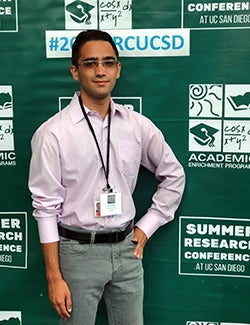
Summer Research Site: University of California, San Diego, Department of Neuroscience, Summer Training Academy for Research Success (STARS) program
Research Topic: Under the mentorship of Jonathan Lin, MD-PhD, I was assigned to genotype 20 Alzheimer's brain tissue samples of various disease progression to test for the efficacy of ApoE-4 as a biomarker for onset development of the disease in correlation to Braak staging.
What was your favorite part about your summer experience?
My favorite part of my experience was being able to shadow my mentors during ocular pathology sign-outs and neuropathology sign-outs where I got to learn how to diagnose various tumors and lesions from biopsy and autopsy samples under the microscope. I also had the privilege of attending brain cuttings where I got to learn some gross anatomy in relation to pathological progression.
What was the most difficult part about your summer experience?
The most difficult part of my experience was putting myself in a position where I could meet and network with as many mentors as possible over the summer, which sometimes involved waking really early to walk two miles if an opportunity to meet a pathologist or attend a poster presentation at the pathology retreat presented itself.
Did you learn anything new about yourself, your research, the graduate school experience, mentorship, etc?
I genuinely learned more about myself within this one summer than I have in my entire college experience. Initially coming in with no idea of what I wanted to pursue in the future, I was presented with ocular pathology and neuropathology and immediately became enamored with the field. After this summer, I can definitely say I have a newfound purpose and a concrete idea of the rest of my academic career. I can't wait to return next summer to hone my pathology knowledge and application. None of this would have been possible without the hard work of BUILD PODER and the partnerships they've formed with various research institutions, for which I'll always be grateful.
Yesennia Escobar Valencia

Summer Research Site: University of California, San Diego, Department of Neuroscience, Summer Training Academy for Research Success (STARS) program.
Research Topic: I worked under the mentorship of UCSD psychology professor Viola Störmer, Ph.D., in her Multisensory Vision and Perception lab. My research was about feature based-attention.
What was your favorite part about your summer experience?
My favorite part was the independence that I felt; I felt free and I got a small view of what it is like to live on my own. I liked this experience but it was also difficult.
What was the most difficult part about your summer experience?
The most difficult part about my summer experience was reading the literature and writing the abstract. It was very hard for me to understand and get through one article and my mentor had to explain the same three articles to me about three times. When I wrote the abstract, my mentor gave it back to me completely corrected. At first it was a little discouraging, but I really liked the feedback.
Did you learn anything new about yourself, your research, the graduate school experience, mentorship, etc?
I learned that it was possible for me to do a research project. It was out of my comfort zone, but even if it’s difficult, I had a grad student and a mentor who helped me. I was really proud of my abstract, I was really proud of it because it was really difficult to write. The literature was hard to understand. When I thought I did well, I sent it to my mentor but she corrected the whole thing. At first I was a little discouraged, but then I was grateful because it was great feedback. This was the first time I was independent and away from home. I learned that it is important to practice self-care and make the right choices to be happy.
Isabella Agyapong

Research Site: Drexel University Department of Physiology and Pharmacology
Research Topic: Under the mentorship of Drexel professor Jacqueline Barker, Ph.D., my research looked at the neural mechanisms that underlie the development of alcohol use disorders.
What was your favorite part about your summer experience?
There are so many things that I enjoyed about the program. First, my mentor was so helpful. This was my first time going away for a summer research program and I was extremely nervous because I did not know what to expect. It was very comforting to have such a kind and helpful mentor. Secondly, the entire lab was very helpful, as they taught me everything I needed to know and were patient with me. Lastly, I have never been to Philadelphia, let alone be by myself without my family, but I loved the city and I’m so glad that I received the opportunity to be there.
What was the most difficult part about your summer experience?
The most difficult part about my summer experience was the first few weeks of the program. There was so much background knowledge that I had no idea about. It also took awhile for information of the project to make sense, but once it did, I loved the process even more, especially because I was able to see my growth.
Did you learn anything new about yourself, your research, the graduate school experience, mentorship, etc?
I learned things about myself that I probably would not have known otherwise. It was evident to me that there are people out there who genuinely want to help students reach their goals. What I took away from this trip was the power of communication. I learned so much from professionals by asking as many questions as possible about everything, despite my shy personality. I also met people who I know will be in my life for a very long time and I'm grateful for that.
Angelica Alberto
Research Site: Northwestern University Department of Physical Therapy and Human Movement Sciences, Chicago, Illinois.
Research Topic: Under the mentorship of professor Netta Gurari, Ph.D., my research involved investigating whether single arm torque perceptual deficits exist in individuals with chronic hemiparetic stroke. The results showed that individuals post-stroke actually had comparable torque matching results to age-matched controls. This really changes the dynamic of how rehabilitation specialists approach therapeutic interventions after an individual endures a stroke.
What was your favorite part about your summer experience?
My favorite part about my summer experience was being surrounded by like-minded and supportive colleagues and faculty who all had the same values as I do when it came to health care and rehabilitation. Through having autonomy to explore the “Windy City” on my own for 10 weeks, I've truly come to learn more about myself.
What was the most difficult part about your summer experience?
From balancing eight to 10 hours in the lab, five days a week, carrying out five-hour data collections for 18 participants, to studying and taking the GRE just this past July (earlier than I intended), applying by the Early Admission Decision Deadline, presenting my research at the National Movement and Rehabilitation Conference at Northwestern just three days just before the start of the fall semester, to pushing myself out of my comfort zone to take advantage of countless networking opportunities—I'd say that this past summer truly was a test of my will power. Yet, what really helped me from feeling overwhelmed was shifting my perspective by constantly looking at the bigger picture—reminding myself that this was an opportunity of a lifetime getting to do research at my dream school, and that I was surrounded by faculty professors and recruiters who basically determined my fate.
Did you learn anything new about yourself, your research, the graduate school experience, mentorship, etc?
I've truly learned to give myself more credibility that I ever had before. Usually, we're our own biggest critic, but the moment we decide to be our own biggest cheerleader and optimize that internal support system, is when breakthroughs start to happen. I never knew that I could have the type of support system that I did, and I’d like to thank my mentors, Netta Gurari and Justin Drogos, DPT. Although I was practically thrown into an entirely new niche of rehabilitative study, they really took the time to make sure I fully understood each component.
If there's anything that someone can take away from all this, it is to take the opportunity to go away for the summer. It's truly life-changing to explore a new city filled with new people and cultures. Thanks to BUILD PODER for pushing us outside of our comfort zones, I came across Northwestern's formal Summer Research Opportunity Program and learned about their Early Admission Decision process that gives SROP scholars a chance to get into their graduate program of choice. And as of September 19, I was admitted early into Northwestern University's Doctor of Physical Therapy Program!
Konstantina Orselli
Research Site: University of Oregon, Department of Marine Biology, Oregon Institute of Marine Biology’s research experience for undergraduates program, “Exploration of Marine Biology on the Oregon Coast” (OIMB REU, EMBOC) program
Research Topic: Under the mentorship of George von Dassow, Ph.D., my research focused on the early development of sand dollar embryos.
What was your favorite part about your summer experience?
My favorite part was really immersing myself in a field of study that I had no prior experience in, seeing how a researcher works and if the occupation is a viable choice for me.
What was the most difficult part about your summer experience?
The most difficult part was coming to terms with what was demanded and accepting failures because that is what scientific research entails.
Did you learn anything new about yourself, your research, the graduate school experience, mentorship, etc?
I learned that a master’s degree can be a better option depending on your end goals. I learned to trust my instinct and to “fake it ‘til you make it.”
